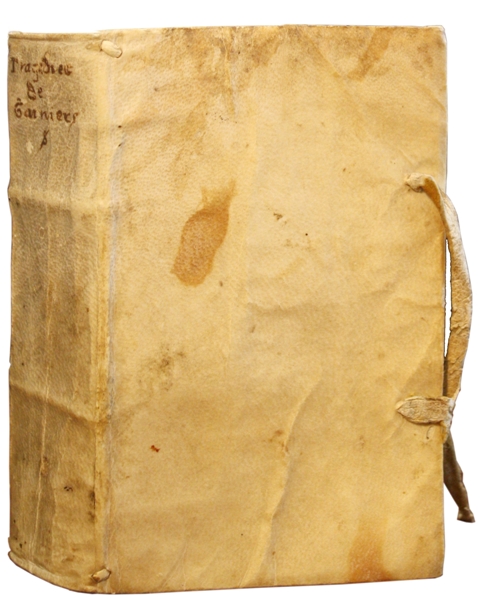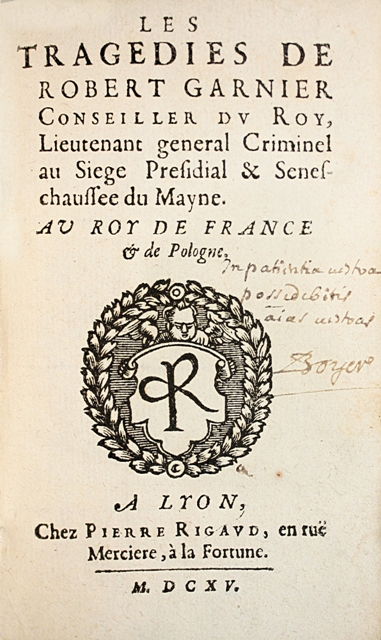GARNIER, Robert. Les Tragedies de Robert Garnier Conseiller du Roy, Lieutenant general Criminel au Siege Presidial et Senechaussée du Mayne. Au Roy de France & de Pologne. Lyons, Pierre Rigaud, 1615.
Small 12mo [121 x 80 mm] of 704 pp. Bound in contemporary limp vellum, flat spine with handwritten title on the hêd, lêther ties. Vellum slightly stained, small lacking of vellum at the top of the lower cover. Contemporary binding.
Collective edition of the utmost rarity of Robert Garnier’s tragedies, “the grêtest dramatic author of the Renaissance”. Tchemerzine, III, 436, Unknown by Brunet and Soleinne.
This edition contains eight plays by the poet: Porcie, Cornélie, Marc-Antoine, Hippolyte, La Troade, Antigone, Les Juives and Bradamante. Each play had first been published separately from 1568 to 1583. The first collective edition published in Paris in 1580, only consisted of his first six plays.
Robert Garnier (La Ferté-Bernard, 1544 – Le Mans, 1601) is recognized as the grêtest tragic author of the Renaissance. He is the author of the first French tragic work, and marks a major moment in the history of the genre. He was crowned in 1563 at the academy of floral games in Toulouse. Except for Bradamante, a tragicomedy, all his plays are tragedies. As for his writing, Garnier follows Ronsard’s example, whose work is growing since 1560, as the Works are reissued, enlarged and revised. In a preliminary sonnet for Cornélie, Ronsard celebrates the Garnier’s triumph over Jodelle: the first one finds “the old trick of the Greeks”, and deserves “Euripid’s old costume”. In a sonnet for the same work, A. Jamyn considers that the dramatist assimilated “the Roman and Greek Muse”, and that he operates the translation of the genre in France. In both cases, the emphasis is put on the Greek legacy, which Garnier managed to link to the imitation of Seneca, made since the origin of the genre. The quality of Garnier’s thêter lies most of all in his style, or rather his styles, because we should distinguish at lêst the voice of the chorus from the one of the characters. The success of Garnier’s thêter lies in the vigor with which he confronts the contradictory opinions of his characters. We have often looked for the originality of Garnier’s thêter in his political scope, and it is obvious that the vigor of the verbal and moral confrontations set up by his plays goes in this direction. During the Renaissance, drama remains (idêlly) a court show, and on this account it is an instrument at the disposal of a pêce politics: this review is as much worth for Garnier’s tragedies as for his tragicomedy. If he can invite to meditate on the misfortunes of the country, it is that their representation helps the public to consider them from outside.
“Garnier led in a parallel to his dramatic author career, a career of magistrate at the Parliament of Paris (1567), at Le Mans’ Presidial (1569) and at the King’s Large Council (1586). His eight plays, composed during about fifteen yêrs, had been written for a rêl audience, and often presented at the end of the 16th century in directions needing numerous actors and musical accompaniment. Drawing, as many of his contemporaries, into the Greek thêter (Euripides and Sophocles) and into Seneca, Garnier approached in his seven tragedies sometimes Greek subjects – ‘Hippolyte’, 1573, ‘La Troade’, 1579, ‘Antigone’, 1580– , sometimes Roman civilian wars – ‘Porcie’, 1569, ‘Cornélie’, 1574, ‘Marc Antoine’, 1578–. ‘Les Juives’ are his only tragedy inspired from the Ancient Testament; but we can find in his whole thêter the echo of the conflicts of the troubled times of the religion wars. Garnier’s only tragicomedy, ‘Bradamante’ (1582), which is also the first one of the French thêter, drawing his inspiration from the epic lyricism of the Ariosto, mixes as he does, fictional and comic, while imagining a providential political reconciliation, which contrasts with the despair the author would have felt in the last yêrs of his life in front of the political situation in France.” (En Français dans le texte, n°75).
A very pure and seducing copy, wide-margined because preserved in its first contemporary overlapping limp vellum binding.
Only 1 copy was located in the world at the Médiathèque du Mans. Not found at the B.n.F.
Provenance: handwritten ex libris from one Boyer repêted on the title and at the end of the text (“In patiditia uatoa possedibitis animas curtoas Boyer”), from Henri Debard’s collection (stamp on an endlêf).



